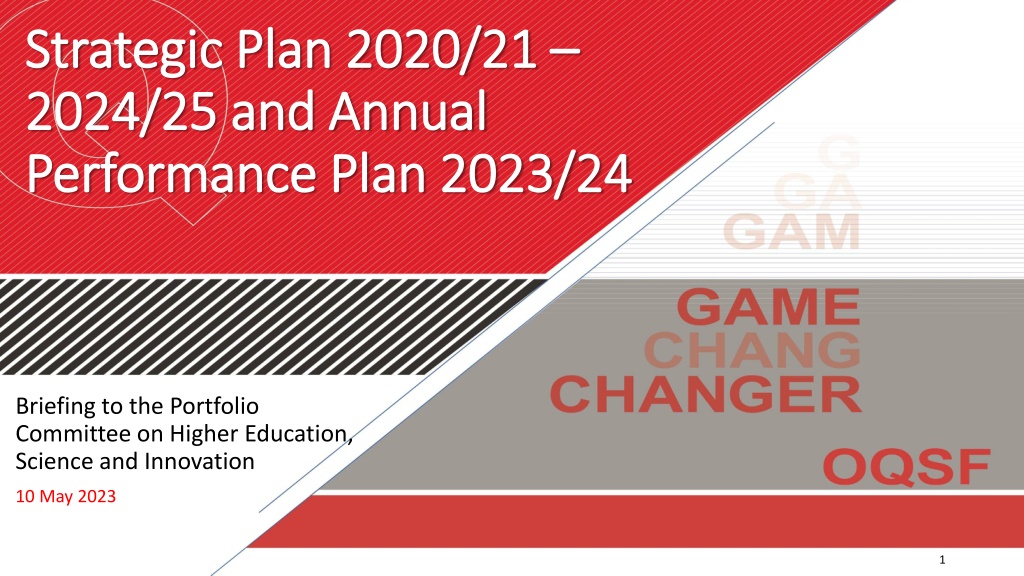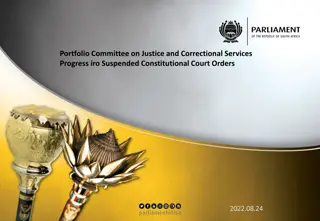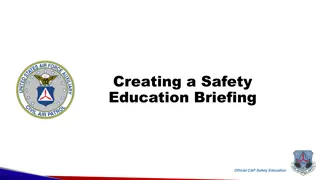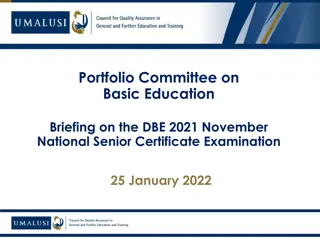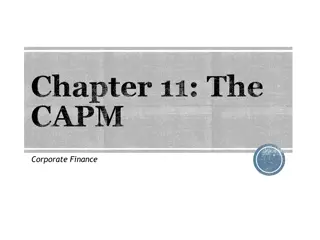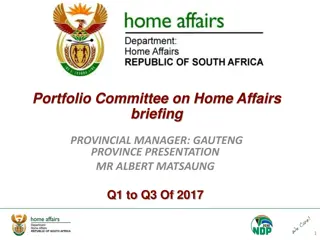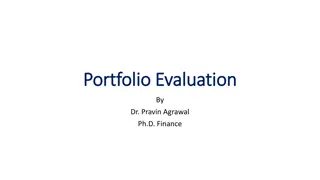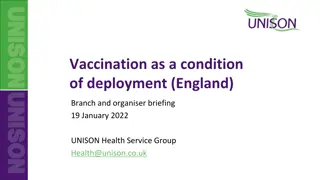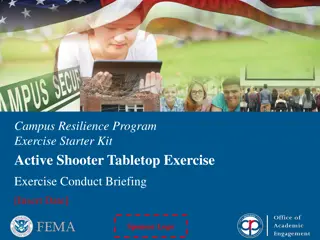The Portfolio Committee Briefing on Higher Education Strategy Plans
The briefing document outlines the Strategic Plan for 2020/21, 2024/25, and the Annual Performance Plan for 2023/24 in the field of Higher Education, Science, and Innovation. It provides an in-depth look at the objectives, goals, and performance targets set for the upcoming years, offering insight into the strategic direction of the portfolio. The document serves as a roadmap for driving progress and enhancing outcomes in the higher education sector.
Download Presentation

Please find below an Image/Link to download the presentation.
The content on the website is provided AS IS for your information and personal use only. It may not be sold, licensed, or shared on other websites without obtaining consent from the author. Download presentation by click this link. If you encounter any issues during the download, it is possible that the publisher has removed the file from their server.
E N D
Presentation Transcript
Strategic Plan 2020/21 Strategic Plan 2020/21 2024/25 and Annual 2024/25 and Annual Performance Plan 2023/24 Performance Plan 2023/24 Briefing to the Portfolio Committee on Higher Education, Science and Innovation 10 May 2023 1
Contents Contents Chairpersons Opening Remarks Vision and Mission Governance Senior Management Structure Legislative Mandate Accounting Authority Statement Situational Analysis Strategic Imperatives Measuring our performance: APP 2023/24 Programme 1: Administration Programme 2: Occupational Qualifications Management, Assessment and Certification Programme 3: Occupational Qualifications Quality Assurance Programme 4: Research Analysis 2
Opening Remarks Opening Remarks The Quality Council for Trades and Occupations was established in terms of the Skills Development Act (Act 97 of 1998). Since the establishment of the QCTO in 2010 and despite the limitations within which the QCTO has had to operate, the QCTO has made significant progress in terms of the implementation of the Occupational Qualifications Sub-framework, its attendant policies, criteria and guidelines. The Council s mandate is to develop and quality assure occupational qualifications and part qualifications (including trades and skills programmes), manage the Occupational Qualifications Sub-Framework, and advise the Minister in all matters of policy concerning occupational standards and qualifications 3 Mr. Themba Dlamini, Chairperson of the Third QCTO Council (appointed 10 November 2022)
Opening Remarks Opening Remarks The reporting period 2023-24 is the 4th of the QCTO Strategic Plan 2020/21 24/25 (revised in 2022/23) . The QCTO is uniquely positioned in the Post School Education and Training (PSET) Sector with its mandate to develop, manage and quality assure occupational qualifications, part-qualifications and skills programmes on the Occupational Qualifications Sub-Framework (OQSF) that are accessible and credible, and will ensure that it meets the demands of the economy; for employers, employees and entrepreneurs. The gazetting of the OQSF by the Minister; MHESI on the 29 October 2021 provides the framework for such positioning. Other initiatives to ensure that the QCTO is able to respond to its extending mandate include: Implementation of the Vision 2027 Strategy Tweaking of its organogram Developing a Management Information System (MIS) 4
Opening Remarks Opening Remarks The implementation the QCTOs legislative mandate is dependent on the QCTO funding received through the SETA LEVY Grant, the DHET allocation and QCTO fees for services rendered. The publication of the Draft Regulations for public comment on the proposed SETA Levy Grant funding, in January 2023, of 1% to the QCTO is also welcomed as it allows for a more stable funding framework. The approval of the Grant Regulations will ensure that the QCTO is able to strengthen its Quality Assurance processes (currently Risk Based) by improving capacity and processes to ensure improved quality assurance reporting on the implementation of the OQSF (as per the mandate of the NQF Act) 5
Opening Remarks Opening Remarks Over the remaining period from 2023/24 to 2024/2025, the QCTO Annual Performance Plan and activities related thereto will be directed by the three Strategic Imperatives: Creating a dynamic Occupational Qualifications Sub-Framework (OQSF) Ensuring the development and quality assurance of occupational qualification, part qualifications and skills programmes that are responsive to labour market and developmental state initiatives Creating a QCTO that is a learning organisation. 6
Introduction Introduction This presentation comes five months after we submitted our mid-term review report to the Department This report noted a number of our achievements over the period and allowed us the opportunity to reflect, evaluate and strategise around how we respond to the growing demand for QCTO services and products. We have, amongst others, continued to achieve clean audits, improve achievement of our annual targets, thus ensuring the development of relevant Occupational Qualifications, Part Qualifications, and Skills programmes, ensuring the quality of provisioning and assessment as well as issuing certificates to qualifying candidates. 7 Mr. Vijayen Naidoo, Chief Executive Officer of the QCTO (re-appointed 1 June 2022)
Vision and Mission Vision and Mission The QCTO s vision is to qualify a skilled and capable workforce. The QCTO s mission is to effectively and efficiently manage the occupational qualifications sub-framework in order to set standards, develop and quality assure national occupational qualifications for all who want a trade or occupation and, where appropriate, professions. 8
Governance Governance EXCO Executive Committee ARC Audit and Risk Committee OQACC Occupational Qualifications, Assessment and Certification Committee QAOQC Council Quality Assurance of Occupational Qualifications Committee ITSC Information Technology Strategic Committee 9
Senior Management Structure Senior Management Structure Mr. Thamba Dlamini Council Chairperson (Appointed 10 November 2022) Mr. V Naidoo Chief Executive Officer (Re-appointed 1 June 2022) Mr. T Lata Chief Director: Occupational Qualifications Management Mr. E Mbuwe Chief Director: Occupational Quality Assurance Ms. N Madilonga- Khondowe Chief Director Corporate Services Mr. Khathutshelo Maposa Chief Financial Officer (Appointed 1 April 2023) 10
Legislative Mandate & Other National Imperatives Legislative Mandate & Other National Imperatives National Qualifications Framework Act No. 67 of 2008 (as amended) Skills Development Act No. 97 of 1998 (as amended) National Skills Development Plan Ministerial Determinations and Guidelines Priority 3: Education, Skills and Health National White Paper on PSET Development Plan Skills Strategy in Support of the South African Economic Reconstruction and Recovery Plan and Implementation Plan (March 2022) National Plan for Post School Education and Training (2021 2030) Occupational Qualifications Sub-Framework (OQSF), 2021 Ministerial Determination, 2020 11
QCTO Mandate as per the National QCTO Mandate as per the National Qualifications Framework Act Qualifications Framework Act Develop and manage its sub-framework, make recommendations and advise the Minister on matters relating to its Sub-Framework. Consider and agree on level descriptors ensuring that they remain current and appropriate. Develop and recommend qualifications to the South African Qualifications Authority for registration. Develop and implement a quality assurance policy for registered qualifications. Maintain a database of learner achievements and submit learners achievement data to SAQA for recording on the National Learner s Records Database. Conduct or commission and publish research. Inform the public about its sub-framework. 12
QCTO Mandate as per the Skills Development Act QCTO Mandate as per the Skills Development Act The QCTO mandate is also outlined in the Skills Development Act No. 97 of 1998, as amended. Section 26H of the ACT outlines the functions of QCTO: Subject to any policy issued by the Minister in terms of section 26F, the QCTO is responsible terms of section 26F, the QCTO responsible for- (a) establishing and maintaining occupational standards and qualifications (b) the quality assurance of occupational standards and qualifications and learning in and for the workplace; (c) designing and developing occupational standards and qualifications and submitting them to the South African Qualifications Authority for registration on the National Qualifications Framework; (d) ensuring the quality of occupational standards and qualifications and learning in and for the workplace; 13
Strategic Plan 2020/2021 Strategic Plan 2020/2021- -2024/2025 The Revised Strategic Plan 2020/2021- 2024/25 ensures greater alignment between QCTO imperatives to the outcomes and plans as contained in the: Revised Medium Term Strategic Framework (MTSF) (Priority 3: Education, skills and health), Department s Revised Strategic Plan Skills Strategy in Support of the South African Economic Reconstruction and Recovery Plan (2022) (ERRSS) National Skills Development Plan 2030 (NSDP) (2019), National Plan for Post School Education and Training (NP PSET), 2021 2030 (2021) This is also evidenced in the current APP for 2023/2024 which will ensure an improved and synergised approach to the ever evolving skills development ecosystem as we move to the full implementation of the Occupational Qualifications Sub-Framework (OQSF) and the National Plan for Post School Education and Training (NP PSET) (2021 2030) 2024/2025 14
Strategic Plan 2020/2021 Strategic Plan 2020/2021- -2024/2025 informed by National Policy Context National Policy Context 2024/2025 informed by DHET Revised Strategic Plan. QCTO contributes to: An integrated and coordinated PSET system. Expanded access to PSET opportunities. Improved success and efficiency of the PSET system. Improved quality of PSET provisioning. A responsive PSET system. QCTO contributes to Priority 3: Education, Skills and Health 15
Strategic Plan 202/2021 Strategic Plan 202/2021- -2024/2025 informed by National Policy Context informed by National Policy Context 2024/2025 The strategy consists of two dimensions, each of which outlines interventions and actions that support the implementation of the ERRP. QCTO developed Plan of Action in response to draft Skills Strategy in 2021 (March 2021) Dimension 1: Interventions focused on the provision of targeted E&T programmes (6 interventions) Dimension 2: Interventions focused on enabling and supporting education-to- work transitions (4 interventions) Interventions has specific actions (where applicable) which the QCTO is required to respond to QCTO has been reporting quarterly at TIF meetings to DHET on the progress made towards the implementation of its applicable actions in response to implementation plan (May 2022) DHET: Skills Strategy was developed in response to ERRP (June 2022) 16
Strategic Plan 2020/2021 Strategic Plan 2020/2021- -2024/2025 informed by National Policy Context informed by National Policy Context 2024/2025 The National Plan for Post-School Education and Training (NPPSET) sets out a roadmap for implementing the policy vision of the White Paper for Post-School Education and Training. The NPPSET sets out key system goals, objectives, outcomes and strategies aimed at achieving an integrated, coordinated, expanded, responsive, cooperative, quality, efficient, successful and articulated post-school education and training (PSET) system over the period 2021/2022 to 2029/2030. 17
Situational Analyses Situational Analyses Vision 2027 Vision 2027 Vision 2027 positions the QCTO as an agile, responsive and learning organisation that is critical to support government imperatives towards a demand led skills development ecosystem and in response to the ERRP towards the establishment of a developmental state. 18
Vision 2027 and Legislative Context (cont.) Vision 2027 and Legislative Context (cont.) The Vision 2027 plan is forward-looking and seeks to achieve two (2) goals. Firstly, to close out QCTO Vision 2020 (the crux of Vision 2020 was for the QCTO to perform ALL functions associated with qualifications management and quality assurance). and secondly to consolidate and solidify the QCTO s position as a Quality Council. In terms of the NQF Act (Act No.67 of 2008) Chapter 5 Section 27, the functions of QCs with regard to quality assurance within its sub- framework are to: (i) develop and implement policy for quality assurance; (ii) ensure the integrity and credibility of quality assurance; (iii) ensure that such quality assurance as is necessary for the sub-framework is undertaken; 19
Vision 2020 Vision 2020 - - Intended Plan Intended Plan 20
Closing out of Vision of 2020 Closing out of Vision of 2020 Funding for plan not approved QCTO was only able to meet the third milestone of Transition to QCTO Supervision Vision 2020 culminated with an agreement that QCTO enter into SLAs to standardise the models of Quality Assurance as well as the policy framework across the sector. Such decision was reached in 2019 after protracted deliberation with the DHET, SETA s and the QCTO. SETAs were requested by DHET to ensure a line item for quality assurance in their budgets. 21
Simplification of the QCTOs operating model Simplification of the QCTO s operating model Activities that contribute to quality assurance devolved to Quality Partners (QP s) through MoUs or SLAs. Model based on local and international best practice in the management of Quality Councils or bodies similar to the QCTO. The QPs that will be conducting direct quality assurance functions (quality control) on behalf of the QCTO are Sector Education and Training Authorities (SETAs) SETAs have the specialist expertise through their chambers and links with industry. Accountability for quality assurance is vested in the QCTO. 22
Situational Analyses Situational Analyses - - REVISED OQSF REVISED OQSF The Minister of Higher Education, Science and Innovation published the Determination of the Sub-Frameworks that comprise the National Qualifications Framework in Government Gazette No. 44031 on 24 December 2020. After further consultation with NQF bodies, the QCTO revised its Occupational Qualifications Sub-Framework (OQSF) Policy to address matters as per the Determination (2020). The Occupational Qualifications Sub-Framework (OQSF) Policy (2021) was approved by the Third Council of the QCTO and has subsequently been approved and published by the Minister on 29 October 2021 (Government Gazette No. 45401 Notice No. 1463). 23
NQF Level 10 NQF Sub- Framework/ Quality Council NQF Sub-Framework/ Quality Council NQF Sub-Framework and Qualification Type Higher Education Qualifications Sub- Doctoral Degree Doctoral Degree (Professional) Master s Degree Master s Degree (Professional) Bachelor Honours Degree Post Graduate Diploma Bachelor s Degree Bachelor s Degree Advanced Diploma Diploma Advanced Certificate Higher Certificate Framework (HEQSF) Council on 9 Education (CHE) 8 Specialised Occupational Diploma Occupational Qualifications Sub-Framework Higher (OQSF) Quality Council for Trades and 7 Advanced Occupational Diploma Occupations (QCTO) Occupational Diploma Advanced Occupational Certificate Higher Occupational Certificate 6 5 General and Further 4 National Certificate National Occupational Certificate (GFETQSF) Umalusi Qualifications Sub- Education and Framework 3 Intermediate Certificate Intermediate Occupational Certificate Training 2 Elementary Certificate Elementary Occupational Certificate 1 General Certificate General Occupational Certificate 24
Specialised Occupational Diploma - NQF Level 8 - Occupational Diploma - NQF Level 7 - Occupational Diploma Advanced Occupational Certificate - NQF Level 6 - May lead to: Articulation with other sub- frameworks Employment/ Self- Employment Further study/ Lifelong learning Higher Occupational Certificate - NQF Level 5 - Part Qualifications Skills Programmes Micro-credentials National Occupational Certificate - NQF Level 4 - Intermediate Occupational Certificate - NQF Level 3 - Elementary Occupational Certificate Promoting access to, and success in Post School Education and Training for the future world of work - NQF Level 2 - General Occupational Certificate - NQF Level 1 - 25
Implications of the Revised OQSF Policy (2021) Implications of the Revised OQSF Policy (2021) Promotes and contributes to a single national coordinated NQF. Parity of Esteem between OQSF and HEQSF and GENFETQSF. Elevating TVET Colleges to become Institutions of Choice Promotes Systematic Articulation between Qualifications on the Sub-Frameworks. HEI s offering OQSF Qualifications. CET s offering Skills Programmes. 26
Mail & Guardian articles Mail & Guardian articles https://mg.co.za/special-reports/2023-03-16-a-game-changer-for-occupational-qualifications/ https://mg.co.za/partner-content/2023-03-27-training-for-the-workplace-a-giant-leap-forward/ 27 A game-changer for Occupational Qualifications, published on 16 March 2023 Training for the workplace: A giant leap forward, published on 27 March 2023
Strategic Imperatives Strategic Imperatives In respect of achieving its full legislative mandate, the QCTO has resolved, that over the remaining period from 2023/24 to 2024/25, it will be directed by the following strategic imperatives which were adopted by Council: Creating a dynamic Occupational Qualifications Sub-Framework (OQSF) Ensuring the development and quality assurance of occupational qualifications, part qualifications and skills programmes that are responsive to labour market and developmental state initiatives. Creating a QCTO that is a learning organization 28 No change made to Revised Strategic Plan updated during 2022/23
Measuring Performance Measuring Performance Impact Statement: To ensure a skilled and capable workforce that is employable or self-employed , through ensuring the development of relevant qualifications, part qualifications and skilled programmes , ensuring the quality of provisioning and assessment and issuing certificates to qualifying candidates. Maintaininga single national quality assured Occupational Qualifications Sub-Framework (OQSF) that promotes synergy, simplification and effectiveness Outcome 1 Ensuringthe development and quality assurance of occupational qualifications, part qualifications and skills programmes are responsive to labour market and developmental state initiatives Outcome 2 Creating a QCTO that is a responsive learning organisation Outcome 3 29
QCTO OPERATIONAL MODEL QCTO OPERATIONAL MODEL 1.Stronger and more cooperative relationships between QCTO and SETA s 2. Strengthen and expand the TVET and CET College System. 3. Review and rationalise occupational qualifications. 4. Improve QA processes and standardize these across the PSET system. 5. Continue to standardise curricula development and Assessments. 6. Improved Research capabilities
QCTO OPERATIONAL MODEL QCTO OPERATIONAL MODEL 1. Historically registered qualifications reduced either by re- alignment to Occupational Qualifications, Part Qualifications or Skills Programmes or de-activation by 2024 2.Implementaion of a Final Integrated Summative Assessment (FISA) to supplement PoEs 3. Certification issued by SETA s upon approval by QCTO Improved uptake of Occupational Qualifications, part qualifications and Skills Programmes by TVETs, CETs, Universities and Private SDP s 1. Occupational Qualifications, Part qualifications and Skills Programmes quality assured by QCTO 2. SDP s and Assessment Centers accredited by QCTO 3. External Integrated Summative Assessment (EISA) quality assured by the QCTO. 4. Certificates for Occupational Qualifications issued by the QCTO 31
Strategic Outcomes and indicators 2020/21 Strategic Outcomes and indicators 2020/21 2024/25 2024/25 Outcome 1: A single national quality assured Occupational Qualifications Sub-framework that promotes synergy, simplification and effectiveness. Contribution of Outcome Enablers Risks Increased participation of various stakeholders in the OQSF will facilitate active interaction between the various stakeholders which is essential in order to have a functional integrated national OQSF system. Better articulation within the NQF will promote access to qualifications, part qualifications and skills programmes within the NQF and encourage Lifelong Learning. The uptake of occupational qualifications, part qualifications and skills programmes will indicate the need of occupational qualification from the demand perspective (e.g. national list of occupations in high demand). The level of employer satisfaction with the OQSF will assist in evaluating and assessing the impact of the OQSF. All of the above have a bearing on the achievement of the intended impact The NQF Act will not change radically, Ministerial guidelines are implemented and that there will be consistency in vision. There is a trusted and reliable QA system that is supported by effective Inter Governmental Relations (IGR) structures e.g. forums etc. Skills requirements will be known (accurate and updated national list of occupations in high demand) and a reliable labour information system is established. There is industry participation where industry participates in identifying and developing qualifications in high demand, QAP s, offer adequate workplace experience/learning, simulation design. There is cohesion and research and Lesson Learned are applied. There is employee and employer buy-in (Approval and internal acceptance of the QCTO business case) Radically changed legislative environment Unreliable QA system Effective implementation of the QCTO QA system. Un-identified skills needs Lack of Industry participation Repetition of past systemic errors No buy-in by Employees and Employers Insufficient funding allocation Impact of the COVID-19 and the implementation of the Disaster Management Act 32
Strategic Outcomes and indicators 2020/21 Strategic Outcomes and indicators 2020/21 2024/25 2024/25 Outcome 1: A single, national, quality-assured Occupational Qualifications Sub-framework that promotes synergy, simplification and effectiveness Outcome Indicator Baseline Five-Year Target 1.1 Quality assurance functions performed by the QCTO for qualifications, part qualifications and skills programmes on the OQSF evaluated and reported on QCTO currently performs all QA functions (accreditation, quality assurance of provisioning, quality assurance of assessment and certification) for newly registered occupational qualifications, part qualifications and skills programmes and provides an Annual Report of such activities An evaluation report on the quality assurance functions performed by the QCTO for qualifications and part qualifications on the OQSF over 5 Years (Baseline report on QA functions completed in 2021/22 and published) 1.2 Level of Articulation between the OQSF, GENFETQA and HEQSF An evaluation report on the extent of articulation of qualifications on the OQSF with qualifications on the other two Sub-frameworks (GENFETQA and HEQSF)33 No baseline established as yet
Strategic Outcomes and indicators 2020/21 Strategic Outcomes and indicators 2020/21 2024/25 2024/25 Outcome 1: A single, national, quality-assured Occupational Qualifications Sub-framework that promotes synergy, simplification and effectiveness Outcome Indicator Baseline Five-Year Target 1.3 Uptake of occupational qualifications, part qualifications and skills programmes 11% 60% (32 out of 300) (2021/22 - 33,4% (211 Occupational Qualifications active out of 630 Registered Occupational Qualifications to current date) Evaluation report on the extent of Industry satisfaction with the OQSF (Research work has commenced) 1.4 Level of Industry satisfaction with the OQSF No baseline established as yet 1.5 Number of comparable Qualifications Frameworks against which the OQSF is benchmarked 5 No baseline established as yet (Completed 2022/23) 34
Strategic Outcomes and indicators 2020/21 Strategic Outcomes and indicators 2020/21 2024/25 2024/25 Outcome 2: QCTO to ensure that development and quality assurance of occupational qualifications, part qualifications and skills programmes are responsive to labour market and developmental state initiatives Contribution Enablers Risks The Minister of Higher Education, Science and Innovation (MHESI) approves the implementation of Economic Reconstruction and Recovery Skills Strategy Occupational qualifications, part qualifications and skills programme are relevant to the needs of the labour market Occupational qualifications, part qualifications and skills programme are developed timeously Occupational qualifications, part qualifications and skills programme are registered TVETs, CETs and Universities capacitated by DHET to deliver occupational qualifications, part qualifications and Skills Programmes (funding and lecturers) If TVETs, CETs and Universities offer occupational qualifications, part qualifications and skills programmes that respond to the skills needs of the industries of the country as identified in the ERRPs, the increase in skills development will significantly contribute to a skilled and capable workforce which will be employable or self- employed. ERRSS not approved by Minister of DHET TVET, CET Colleges, Universities, and Private Skills Development Providers do not implement the occupational qualifications, part qualifications and skills programmes in high demand TVET, CET Colleges, Universities and Private Skills Development Providers do not have the capacity to offer occupational qualifications and skills programmes 35
Strategic Outcomes and indicators 2020/21 Strategic Outcomes and indicators 2020/21 2024/25 2024/25 Outcome 2: QCTO to ensure that development and quality assurance of occupational qualifications, part qualifications and skills programmes are responsive to labour market and developmental state initiatives Outcome Indicator Baseline Five-Year Target 2.1 Percentage of occupational qualifications, part qualifications and skills programmes developed as identified in the DHET Economic Reconstruction and Recovery Skills Strategy 2.2 Number of occupational qualifications, part qualifications and skills programmes in high demand offered by TVET Colleges No Baseline established as yet 80 % Percent of qualifications developed as identified in the DHET Economic Reconstruction and Recovery Skills Strategy As per targets in the approved DHET Revised Strategic Plan and ERR SS (Additional 13 Occupational qualifications and Skills Programmes are offered by TVET Colleges ) As per agreed targets in the approved DHET Revised Strategic Plan and ERR SS 14 occupational trade qualifications 2.3 Number of occupational qualifications, part qualifications and skills programmes in high demand offered by Universities No baseline established as yet. 36
Strategic Outcomes and indicators 2020/21 Strategic Outcomes and indicators 2020/21 2024/25 2024/25 Outcome 2: QCTO to ensure that development and quality assurance of occupational qualifications, part qualifications and skills programmes are responsive to labour market and developmental state initiatives Outcome Indicator Baseline Five-Year Target 2.4 Number of occupational qualifications, part qualifications and skills programmes in high demand offered by CET Colleges As per agreed targets in the approved DHET Revised Strategic Plan and ERR SS (2021/22-4 Skills Programmes are offered by CET Colleges) No baseline established as yet 2.5 Number of occupational qualifications, part qualifications and skills programmes in high demand offered by Private Skills Development Providers 2.6 Number of TVET Colleges offering occupational qualifications part qualifications and skills programmes in high demand As per ERRSS No baseline established as yet As per agreed targets in the approved DHET Revised Strategic Plan and ERR SS 2021/22-15 TVET colleges accredited for Occupational Qualifications and Skills Programmes No baseline established as yet 37
Strategic Outcomes and indicators 2020/21 Strategic Outcomes and indicators 2020/21- - 2024/25 2024/25 Outcome 2: QCTO to ensure that development and quality assurance of occupational qualifications, part qualifications and skills programmes are responsive to labour market and developmental state initiatives Outcome Indicator Baseline Five-Year Target 2.7 Number of CET Colleges offering occupational qualifications part qualifications and skills programmes in high demand As per agreed targets in the approved DHET Revised Strategic Plan and ERR SS (2021/22-21 CET Learning Sites accredited for Skills Programmes ) As per agreed targets in the approved DHET Revised Strategic Plan and ERR SS No baseline established as yet 2.8 Number of Universities offering occupational qualifications part qualifications and skills programmes in high demand 2.9 Number of Private Skills Development Providers offering occupational qualifications part qualifications and skills programmes in high demand No baseline established as yet As per agreed targets in the approved DHET Revised Strategic Plan and ERR SS No baseline established as yet 38
Strategic Outcomes and indicators 2020/21 Strategic Outcomes and indicators 2020/21 2024/25 2024/25 Outcome 3: QCTO is a responsive learning organisation Contribution Enablers Risks The availability of financial and human resources. The availability of reliable, (demand) data. Enabling legislation. Partnerships, buy in/support from all stakeholders for the achievement of the outcome. Political will. Implementation of relevant research recommendations. By being responsive to the environment and having the capacity to meet the identified needs, the achievement of this outcome will contribute to the achievement of the intended impact as stated in terms of policy priorities. Lack of funding Lack of buy-in/ support from key stakeholders Not becoming a learning organisation 39
Strategic Outcomes and indicators 2020/21 Strategic Outcomes and indicators 2020/21 2024/25 2024/25 Outcome 3: QCTO is a responsive learning organisation Outcome Indicator Baseline Five-Year Target 3.1 The relevance and responsiveness of the QCTO and the OQSF evaluated No baseline established An evaluation report that measures sectoral perceptions of the relevance and responsiveness of the QCTO and the OQSF (Research Unit has begun to gather information for the report) 40
Annual Performance Plan 2023/24 Annual Performance Plan 2023/24 1. ADMINISTRATION 2. OCCUPATIONAL QUALIFICATIONS MANAGEMENT, ASSESSMENT AND CERTIFICATION 3. OCCUPATIONAL QUALIFICATIONS QUALITY ASSURANCE 4. RESEARCH ANALYSIS 41
Measuring our performance: APP 2023/24 Measuring our performance: APP 2023/24 Programme No Purpose of the programme 1 Administration To enable QCTO performance through strategic leadership and reliable delivery of management support services that will ensure a responsive and learning organisation. 2 Occupational Qualifications Management, Assessment and Certification To ensure that occupational qualifications, part-qualifications and skills programmes on the OQSF are available; assessed and certificates are issued to qualifying learners; verify the authenticity of certificates issued; and maintain stakeholder relationships. 3 Occupational Qualifications Quality Assurance To establish and maintain quality standards for Accreditation and Assessment within the OQSF. 4 Research Analysis To establish and maintain QCTO Standards for quality assurance through research, monitoring, evaluation and analysis 42
Programme Performance Indicators Programme Performance Indicators No. of indicators per programme Programme Annual Targets Bi-Annual targets Quarterly Targets One 4 4 - - Two 10 1 3 6 Three 11 3 - 9 Four 2 2 - - Total Distribution 27 10 3 15 Percentage Distribution 37% 11% 55% 43
Programme 1 Programme 1 Outputs 1.1 A capacity building strategy is developed and implemented Output Indicators* Annual Targets 1.1.1 % implementation of the capacity building strategy 20% of the capacity building strategy implemented (Year 3) 1.2 MSP is developed and implemented 1.2.1 % implementation of the MSP MSP Annual Plan deliverables 100% Implemented 20% of the Marketing and Communications strategy implemented (Year 3) 1.3 A Marketing and communications strategy is developed and implemented 1.3.1 % implementation of the Marketing and Communication Strategy 1.4 A change management strategy is developed and implemented 1.4.1 % implementation of the Change management strategy 40% of the Change management strategy implemented (Year 2) 44
Programme 2 Programme 2 Outputs Output Indicators Annual Targets 2.1.1 % of prioritised occupational qualifications (full/part) processed. (approved and/or declined for recommendation to SAQA for registration on the OQSF) within 90 working days. 75% 2.1.Occupational Qualifications and part qualifications recommended for registration on the OQSF 2.1.2 % of remaining Historically Registered Qualifications recommended to SAQA for deactivation on the OQSF 2.1.3 % of prioritized skills programmes processed (Approved and/or declined by the QCTO CEO) within 90 working days 2.2.1 % of assessments for occupational qualifications and part qualifications quality assured against QCTO standards within 21 working days turnaround time 80% 75% 90% 2.2 A national External assessment is implemented for all qualifications registered on the OQSF 2.2.2 % of assessments for remaining historically registered qualifications quality assured against QCTO standards (excluding historical skills programmes and NATED) within 21 working days turnaround time 2.2.3 % of assessments for QCTO approved skills programmes quality assured against QCTO standards within 21 working days 90% 80% 2.2.4 % of Quality Partners (or Assessment Bodies) quality assured against QCTO compliance assessment standards 90% 45
Programme 2 Programme 2 Outputs Output Indicators Annual Targets 2.3.1 % of certificates issued within the turnaround time (21 working days) 2.3 A certification system is maintained 95% 2.3.2 % of verification of authenticity of certificates requests received and verified within turnaround time (5 working days) 95% 46
Programme 3 Programme 3 Annual Targets 90% Outputs Output Indicators 3.1 A national Accreditation system is implemented for all qualifications registered on the OQSF. 3.1.1 % of Skills Development Providers accreditation applications for Occupational qualifications and, part qualifications processed within the turnaround time (90 working days) 3.1.2 % of Skills Development Providers accreditation applications for approved Skills Programmes processed within the turnaround time (90 working days) 80% 3.1.3 % of Skills Development Providers accreditation applications for historically registered Qualifications (Trades, non-Trades, NATED Report 190/191, Skills Programmes) processed within the turnaround time (90 working days) 3.1.4 % of assessment centre accreditation applications processed (accreditation granted or declined) within the turnaround time (30 working days) 3.2.1 % of accredited SDPs with implemented occupational qualifications and part qualifications quality assured according to QCTO standards 80% 90% 3.2 A national quality assurance system is implemented for all qualifications registered on the OQSF 80% 3.2.2 % of accredited SDPs implementing remaining historically registered qualifications (excluding NATED Report 190/191 Programmes) quality assured against QCTO compliance standards. 75% 47
Programme 3 Programme 3 Annual Targets Outputs Output Indicators 3.2 A national quality assurance system is implemented for all qualifications registered on the OQSF 3.2.3 (a) Report on quality assurance of accredited SDPs implementing NATED Report 190/191 (N4-N6) compliance with QCTO standards. 2 Reports 3.2.3 (b) Report on Quality Assurance of NATED Report 190/191 (N4 N6) instructional offering exam sessions and marking sessions against QCTO standards. 2 Reports 3.2.4 Report on compliance of accredited SDPs implementing skills programmes against QCTO Quality Assurance Standards 4 Reports 3.2.5 Report on compliance of accredited assessment centres conducting EISAs (External Integrated Summative Assessments) against QCTO Quality Assurance Standards. 2 Reports 48
Programme 3 Programme 3 Annual Targets Outputs Output Indicators 3.3 Uptake of occupational qualifications and skills programmes by TVET Colleges, CET Colleges, Universities and Private Skills Development Providers 3.3.1 Report on occupational qualifications, part qualifications and skills programmes in high demand offered by TVET Colleges, CET Colleges, Universities and Private Skills Development Providers Report approved by CEO 49
Programme 4 Programme 4 Annual Targets 3 Outputs Output Indicators 4.1 Research on issues of importance to the development and implementation of the OQSF conducted or commissioned and published 4.1.1 Number of Research reports approved by the CEO 4.1.2 Research Bulletin published online 1 50
